You limit junk food and maintain an active lifestyle, and you are feeling good, but something doesn’t seem right, you notice that you are losing inches but not weight. How come?

You might use a scale to track your weight loss efforts if you’re trying to lose weight. If so, even if you notice non-scale indicators like your clothes fitting more loosely or the need to tighten your belt, it might be disheartening and upsetting to find that you aren’t losing weight.
We’ll go into greater depth about each of these reasons for losing inches but not pounds in this article, as well as whether or not you should be concerned. Moreover, we’ll go through what you should and shouldn’t do if you’re losing inches without gaining weight.
Why Are You Losing Inches But Not Weight?
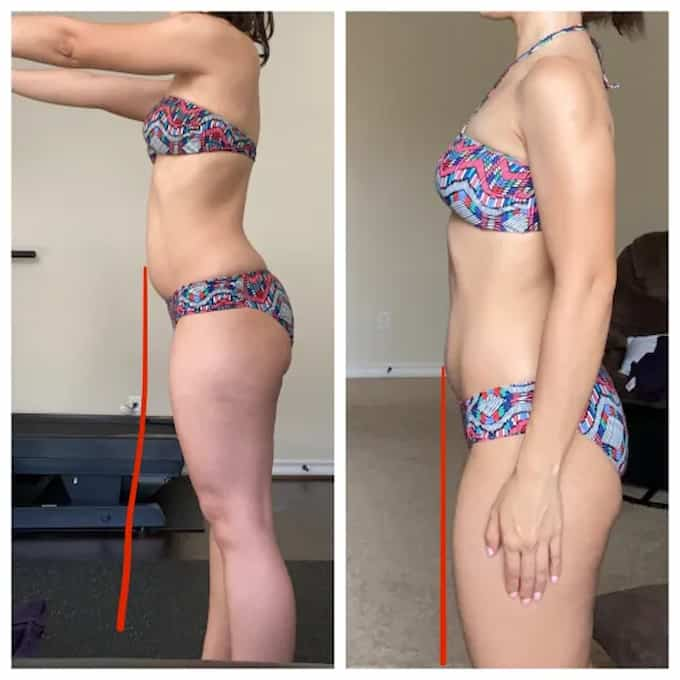
Most of the time, there isn’t just one reason why you’re losing inches instead of weight. It frequently includes a variety of factors, some of which you can influence and some of which you can’t.
You’re Experiencing A Recomposition
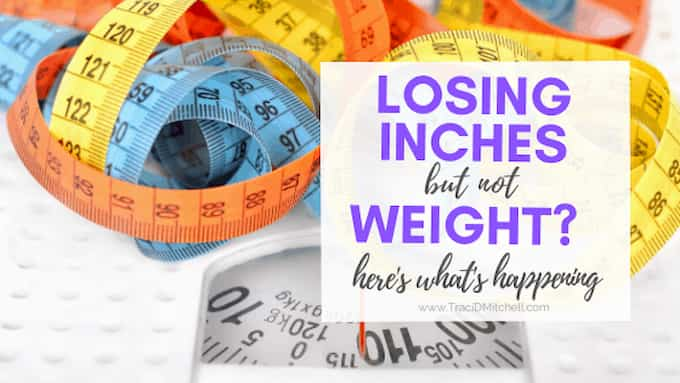
Body recomposition, or body recomposition occurs when you grow muscle while also losing fat. You’re attempting to make yourself smaller and bigger at the same time, which is a challenging and drawn-out process because the two goals are in contradiction with one another. Although unlikely, it is a valid explanation for why you are losing inches but not weight.
Recomp usually calls for you to eat at maintenance or the number of calories you can eat each day without gaining weight. The calorie deficit is small enough that you can lose fat, but it will do so more slowly than the usual 0.5–1 lb/week loss.
While many people recomp on purpose, you can inadvertently be doing it if you aren’t tracking your calories correctly and aren’t in as large of a calorie deficit as you think.
You Reached A Plateau
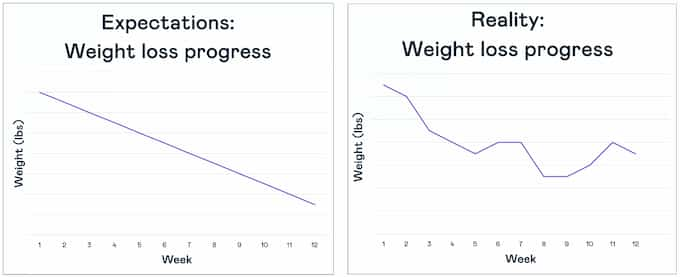
Especially if you’ve been in a calorie deficit for several weeks or months, weight loss plateaus are frequent. If you haven’t adjusted your exercise regimen in a while, plateaus may also happen.
This is due to the fact that your body adapts to various eating and exercise habits. As you lose weight, your metabolism also slows, so if you don’t change your calorie consumption, you won’t be in a calorie deficit any longer. Your progress will be slowed since you can reach a phase where fat loss vs weight loss is less of an aim and more of a recomp phase.
You Have More Bone Density
Exercises like lifting and aerobics not only stimulate muscle growth but also improve bone density. According to research, there are correlations between bone density and body weight. Bone density is the measure of the number of bone minerals in your bones.
Bone density isn’t fully to blame for losing inches but not weight, as a higher bone density will only add a few additional pounds to your frame.
You Are Inflamed From Training
Your muscles experience micro tears as a result of lifting and intense exercises like CrossFit. Inflammation can increase as your muscles attempt to repair this damage, which is known as exercise-induced muscle damage.
Your muscles begin to retain more water as a result of the inflammation, which might lead your weight to increase by a few pounds. This is more likely to happen if you start a new exercise regimen or abruptly increase your volume or frequency of training.
It’s important to remember that weight gain brought on by training inflammation only lasts a short time. Anecdotally, we can tell that whenever we begin a new training block, our weight always rises by 2-3 pounds. But after a few weeks, things settle down, and we often lose a few pounds during a deload week when we are not exercising as intensely.
You Are Retaining Water
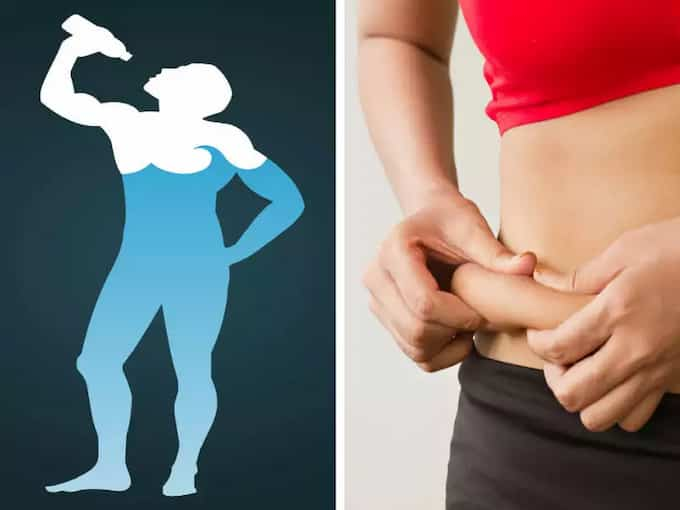
Because it changes your hydration levels, eating a high-sodium meal or abruptly taking more carbs than usual might lead to water retention. Due to an increase in cortisol, the body’s major stress hormone, being under a constant state of stress can also result in water retention.
If your digestive system is being affected by undiagnosed food allergies or intolerances, you can also experience water retention (though you should get this confirmed by a doctor).
Whatever the cause, water retention might result in weight gain that is only temporary due to the amount of water that your body is retaining.
You Are On Your Period

The menstrual cycle in women can lead to bloating and water retention, which can temporarily increase the weight on the scale. Food cravings are frequently intense in the days before your period as well. Giving in to those cravings, particularly if they involve fatty or salty meals, might worsen bloating.
Fortunately, your weight should return to normal within a few days as long as you don’t completely slack up on your eating during your period and get back on track once it’s over.
Not Consistently Weighing Yourself
Your weight may fluctuate during the day depending on your eating habits, bathroom usage, whether you exercised that day or not, and your gym regimen. Your results may vary if you weigh yourself in the early morning on some days and in the late afternoon on other days.
The same remains true if you weigh yourself on different days while wearing clothes and other days while being completely naked, or if you weigh yourself on a different type of floor each time.
Your Scale Is Not Accurate
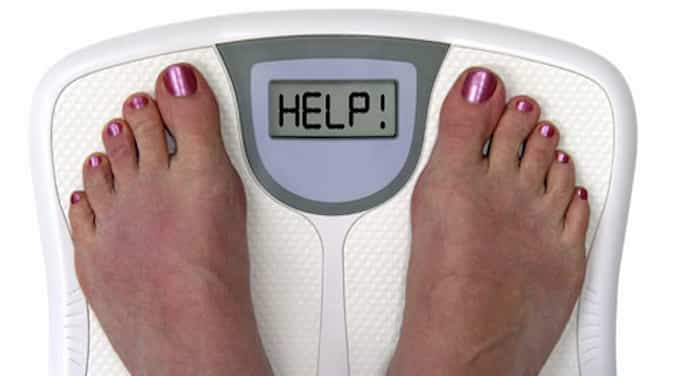
If you weigh yourself every day at the same time on the same scale and you still don’t see any changes, there could be a problem with your scale.
That’s not to say that, just because you don’t like the number it shows, you should go out and buy a new scale or start searching up do-it-yourself solutions for the one you already have.
However, if it has been showing the exact same number every single day for a few weeks or if it significantly changes from day to day in, either way, it probably needs to be fixed. It might only need a reset or new batteries. Making ensuring the floor it’s on is level can sometimes be enough to resolve the issue.
But what you should do when you are losing inches but not losing weight? Read on to know the answer.
Losing Inches But Not Weight: What You Should Do

Here is what you should do when you are losing inches but not losing weight.
Stop Weighing Yourself Daily
You can determine the best ways like how specific foods affect your weight by weighing yourself every day. However, it can also have a negative effect on your mental condition and make it more difficult for you to see your visual development.
Limit how frequently you weigh yourself if the figure on the scale regularly makes you angry. Instead, weigh yourself every other day or once each week. If you still feel that’s too much, you might want to stop weighing yourself for a while.
Maintain Your Training
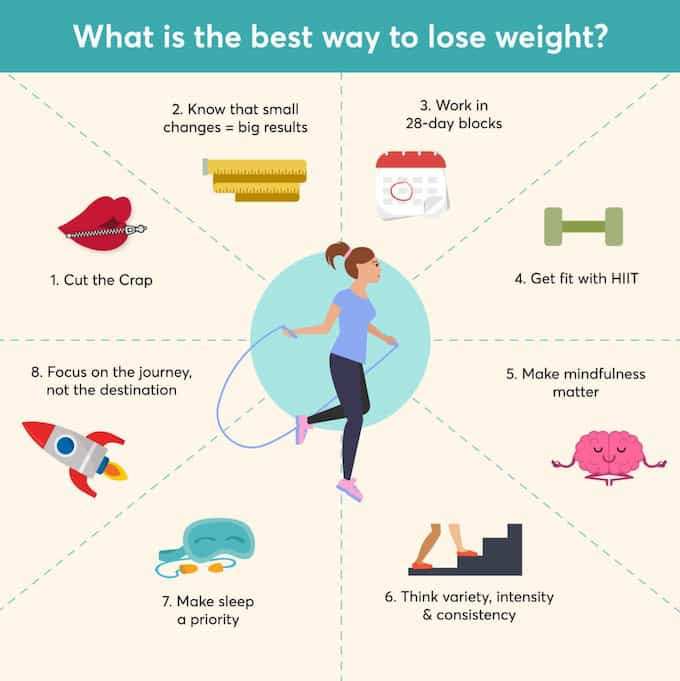
You should keep lifting weights even if you think that the cause of your weight loss has slowed down is that you’re holding onto inflammation from your exercises.
When attempting to lose weight, it’s essential to maintain muscle mass so you can keep your body fat percentage down. Losing weight will result in some muscle loss, but adhering to a strength training regimen will make sure that most of your weight loss comes from fat instead.
Maintain A High Protein & Carbohydrate Intake
Undoubtedly, you’ve heard people praise low-carb diets for how quickly they can help people lose weight. While that might be the case, studies have shown that very low-carb diets, like the keto diet, can prevent your body from building on muscle.
Hence, even if you want to lose weight faster, you need to continue eating carbs in order to achieve your body composition goals.
You should also make sure you’re getting enough protein in your diet to aid in recovery, satiety, and muscle mass retention. For those who are physically active, it’s a good idea to consume 0.8g of protein for every pound of body weight.
You now know what you should do when you are losing inches but not losing weight but there are still some things you need to avoid.
Losing Inches But Not Weight: What You Should NOT Do
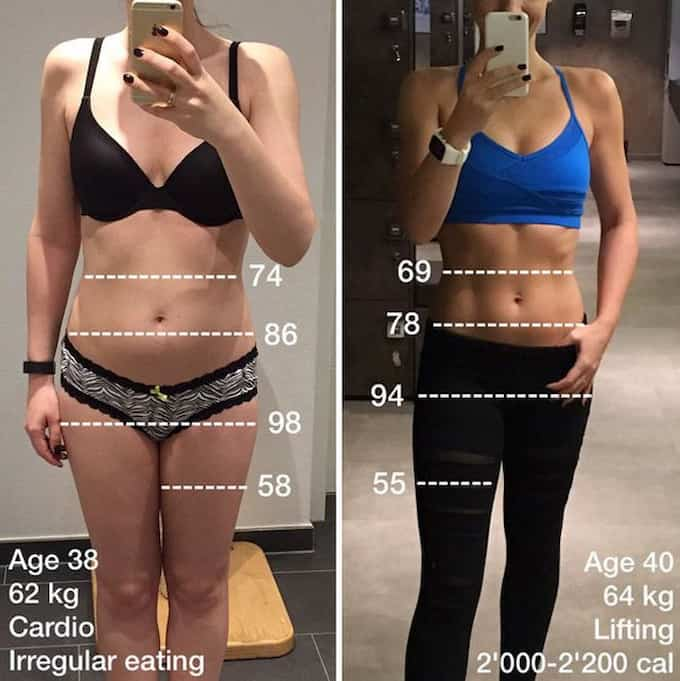
Freak Out
We are aware that it can be difficult if you feel as though it is impossible to reach a particular weight goal. However, getting upset, trying to eat for comfort, and stopping your exercise regimen will only worsen the situation.
In addition, it’s frequently more vital to be satisfied with your body than with your weight. You are losing fat and increasing your body composition if you are losing inches. That visual change should boost your self-confidence much more than a number on a scale.
Reduce Your Caloric Intake To Dangerously Low Levels
It was previously mentioned that continuing to lose weight will be more difficult if you don’t alter your calorie intake after hitting a plateau. The longer you stay in a fat-loss phase, the more calories you may need to gradually cut down on, but this doesn’t mean you should start skipping meals or consuming minuscule amounts of food.
Not eating enough can have serious negative effects on your health, lowering your immune system and affecting your memory and concentration. Going to extremes to lose a few extra pounds is not worth any of these.
Work Out More

If you consistently perform the same workouts, your weight loss may stall. However, while changing the way you work out can help you get over a plateau, you don’t necessarily need to do more. Excessive exercise can lower energy levels, increase injuries, and lower motivation.
Instead, look for ways to vary your routine so that you may continue to exercise successfully without exhausting yourself in the gym. You can accomplish this by switching from steady-state exercise to more high-intensity interval training (HIIT) workouts or by trying various forms of cardio.
If you strength train, you should also make sure your workouts are intense enough by using weights you find hard and increasing your weight as particular exercises become easier for you.
Eliminate Entire Food Groups
You must avoid foods that include ingredients like gluten or dairy if you have a real food allergy that has been confirmed by a doctor. However, it is not a good idea to eliminate all carbs or fats from your diet in order to hasten weight loss.
Not only can this cause you to lose out on important vitamins and nutrients, but it can also lead you to gain weight quickly once you start eating those foods again.
Frequently Asked Questions
Why am I losing inches but gaining weight, how come?
You can experience gaining weight but losing inches, it’s likely that you have water retention. There are many peaks and valleys in the process of losing weight, which is not linear. You can notice weight loss, weight gain, or even no change in your weight from one day to the next. Your weight varies partially as a result of fluid shifts or water retention.
What happens for every 10 pounds you lose you gain an inch?
Cancer risk is increased by chronic inflammation in many circumstances, including breast and uterine cancer. It has been demonstrated that losing 10 pounds significantly lowers your body’s excess production of these hormones, therefore lowering inflammation and cancer risk.
Does losing weight increase size or not?
According to the majority of experts, every 10 to 12 pounds of the weigh down should be expected to result in a change in how your clothes fit or a change in clothing size. Furthermore, weight changes do not occur evenly throughout the body. For example, your bra size can decrease more quickly than your pant size.
You know that, loss weight is not the best way to have nice body. Kylie Jenner has heavy weight but she still hot body.
Read more: How Much Does Kylie Jenner Weigh?
Is it possible for losing fat but not weight?
Why am I not losing weight, you may wonder? It’s possible to increase lean muscle and decrease body fat without really losing weight, which happens when you gain muscle while losing body fat. Even if your weight remains the same while you lose inches, this is a positive sign that you’re in the right direction.
Why is it gaining muscle but not losing fat woman?
There are some signs you’re losing belly fat. This situation often comes down to your diet. It’s possible that you’re eating too many calories and that you should cut back a little.
Why you lost weight but not inches?
If you’re losing weight but not inches, it’s likely that you’re also losing water and muscle, the same weight more muscle.
How many pounds to lose an inch?
Usually, it takes 8 pounds to lose your first inch of body fat. Because the majority of it will be water weight, Due to water weight vs fat, a faster weight loss vs fat loss in the initial few weeks of your journey is common.
Why are you losing weight but not belly fat?
Why am I not losing belly fat, you may wonder yourself. In case you are working out but gaining weight in stomach, a low-carb diet will aid in weight loss because it causes the muscles’ glycogen to lose water, how to not be fat? However, in this case, fat won’t burn. Moreover, losing weight quickly while participating in cardio may take some time.
Where do you lose weight first in your body?
Men typically lose weight first in their stomachs, the same weight different body, while women typically lose weight across their bodies but maintain it in their thighs and hips.
How to lose inches off waist fast and safely?
The best way to lose belly fat is to eat a balanced, healthy diet that is high in fruits and vegetables, as well as soluble fiber, vitamin D, and probiotics.
How many inches can you lose in a month for women and men?
Some people that lose four to eight pounds can lose up to five to ten inches in a month.
How to lose belly fat without losing weight for women and men?
How to get skinny? You can lose belly fat, get skinnier without losing weight by doing core exercises or you may learn how to use bathroom habit to lose weight.
Why am I losing weight but eating more than usual?
Even when they eat normally, some people still may lose weight. It’s known as cachexia. Your body may not be absorbing all of the fat, protein, and carbs from the food you eat if you have cachexia. And you might be burning calories more quickly than usual.
Why my face is getting fat but not my body?
Typically, weight gain is the cause of increased face fat. Water retention, which can give the face a puffy or swollen look, may also be to blame. Making dietary and lifestyle changes can promote female face weight loss and help prevent extra face fat and show weight loss face change.
Why am I losing weight without trying to lose?
Stressful situations like divorce, job loss, or the loss of a loved one may be the root of it. Malnutrition, a medical condition, or a combination of factors are additional possible causes.
Why am I not losing weight on Keto diet?
Usually, when someone follows a ketogenic but doesn’t lose weight, it’s because they haven’t entered ketosis.
How can I lose weight without exercising or working out?
- Consume a lot of protein.
- Obtain plenty of water.
- Keep unhealthy food away.
- Consume a lot of fiber.
- Use smaller plates for some foods having more calories.
- Maintain portion sizes.
- Maintain mindful eating.
- Glow up Mentally & Physically
Does fat or muscle weigh more?
Muscle weighs more than fat, simply said, a pound of fat and a pound of muscle weighs the same. Since muscle is much denser than body fat, this is the difference.
Where does the fat go when you lose weight?
8.4 of every 10 pounds of fat burned is exhaled as carbon dioxide or 84 percent. Through urine, sweat, tears, breath, and other bodily fluids, the remaining 16 percent leaves the body as water
Final Thoughts
It can be frustrating when weeks pass and your weight hasn’t moved when you’re attempting to lose weight and have a weight goal in mind. You might not even be aware that you’re losing inches but not weight and still changing your body composition since you’re so focused on the weight.
When this happens, it usually isn’t a problem. This could be caused by something as simple as your scale’s batteries needing to be changed. But even if that doesn’t make a difference, it’s crucial to keep going.
The scale alone won’t always indicate how much progress you’re making, and keeping with your diet and exercise regimen consistently will yield some exciting results.
Above are the best sharing about “losing inches but not weight” and all bio about her from https://www.buddingstem.com/. Hope you are satisfied with this information.
If you want to update more information, contact us:
- Email: info@buddingstem.com
- Phone: +18002758777
- Add: United Stated – P.O. Box 33982, Seattle, WA 98133
- Fanpage: instagram.com/buddingstem/